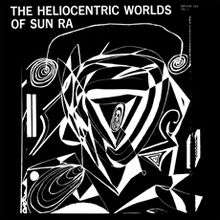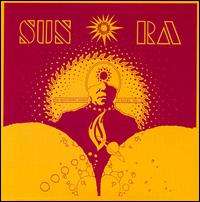The Heliocentric Worlds of Sun Ra, Volume One
| The Heliocentric Worlds of Sun Ra, Volume One | ||||
|---|---|---|---|---|
 | ||||
| Studio album by Sun Ra | ||||
| Released | 1965 | |||
| Recorded |
April 20, 1965, RLA Studio, New York City | |||
| Genre | Avant-garde jazz | |||
| Length | 35:07 | |||
| Label |
ESP-Disk Fontana Records | |||
| Sun Ra chronology | ||||
| ||||
| Alternative cover | ||||
 ESP second and subsequent pressings, 1966 | ||||
| Professional ratings | |
|---|---|
| Review scores | |
| Source | Rating |
| All About Jazz | |
| AllMusic | |
| The Rolling Stone Jazz Record Guide | |
The Heliocentric Worlds of Sun Ra, Volume One is a 1965 album by the jazz musician Sun Ra. The back cover describes it as an "album of compositions and arrangements by Sun Ra played by Sun Ra and his Solar Arkestra".
The album is a notable example of the radical break which Sun Ra's music of that time had made with "previous notions of melody or harmony".[4] Although heavily percussive, the music also dispenses with a continuous beat; instead Ra's music is reconstructed around "interweaving compositional and improvisatory creative principles with programmatic affects".[5]
The album was originally released as The Heliocentric Worlds of Sun Ra, with a B/W sleeve designed by Ra himself.[6] This was replaced with a new orange and red sleeve by Howard Bernstein & Baby Jerry - showing Sun Ra with the third eye - and the appendage Vol. 1 added when The Heliocentric Worlds of Sun Ra, Volume Two was released in 1966.
The album was re-released on CD by ZYX-Music (ESP 1014-2) in the 1990s.
Gene Tyranny describes the album in his review as
The astonishing sessions that went light years beyond "free jazz" improvisation to create a music of deeply felt explosive and gentle gesture made from sound itself without reference to previous notions of melody or harmony.[7]
Recording the album
Marshall Allen described the recording of the album in John F Szwed's biography of Ra, Space Is The Place;
"Sun Ra would go to the studio and he would play something, the bass would come in, and if he didn't like it he'd stop it; and he'd give the drummer a particular rhythm, tell the bass he wanted not a 'boom boom boom,' but something else, and then he'd begin to try out the horns, we're all standing there wondering what's next...
"I just picked up the piccolo and worked with what was going on, what mood they set, or what feeling they had. A lot of things we'd be rehearsing and we did the wrong things and Sun Ra stopped the arrangement and changed it. Or he would change the person who was playing the particular solo, so that changes the arrangement. So the one that was soloing would get another part given to him personally. 'Cos he knew people. He could understand what you could do better so he would fit that with what he would tell you." Marshall Allen [8]
Track listing
All compositions by Sun Ra
12" Vinyl
Side A:
- "Heliocentric" – 4:00
- "Outer Nothingness" – 7:40
- "Other Worlds" – 4:18
Side B:
- "The Cosmos" – 7:20
- "Of Heavenly Things" – 5:40
- "Nebulae" – 3:16
- "Dancing in the Sun" – 1:50
Recorded at Studio RLA, New York, April 20, 1965. Engineered by Richard L Alderson.
Musicians
- Sun Ra - Piano, Bass marimba, Electric Celeste, Timpani
- Chris Capers - Trumpet
- Teddy Nance - Trombone
- Bernard Pettaway - Bass Trombone
- Marshall Allen - Piccolo, Alto sax, Bells, Spiral Cymbal
- Danny Davis - Flute, Alto Sax
- Robert Cummings - Bass Clarinet, Woodblocks
- John Gilmore - Tenor Sax, Timpani
- Pat Patrick - Baritone Sax, Timpani
- Ronnie Boykins - Bass
- Jimhmi Johnson - Drums, Percussion, Timpani
Adapted from the ESP Sleeve notes.
See also
References
- ↑ All About Jazz review
- ↑ Allmusic review
- ↑ Swenson, J. (Editor) (1985). The Rolling Stone Jazz Record Guide. USA: Random House/Rolling Stone. p. 186. ISBN 0-394-72643-X.
- ↑ Tyranny, Blue Gene. "The Heliocentric Worlds of Sun Ra, Vol. 1". Allmusic. Retrieved 2008-11-09.
- ↑ Jost, Ekkehard (1974). Studies in Jazz Research 4: Free Jazz. Universal Edition. p. 187.
- ↑ Sun Ra Discography, R Campbell
- ↑ All Music Guide
- ↑ Quoted in Space Is The Place, Szwed, Mojo, 2000, p216